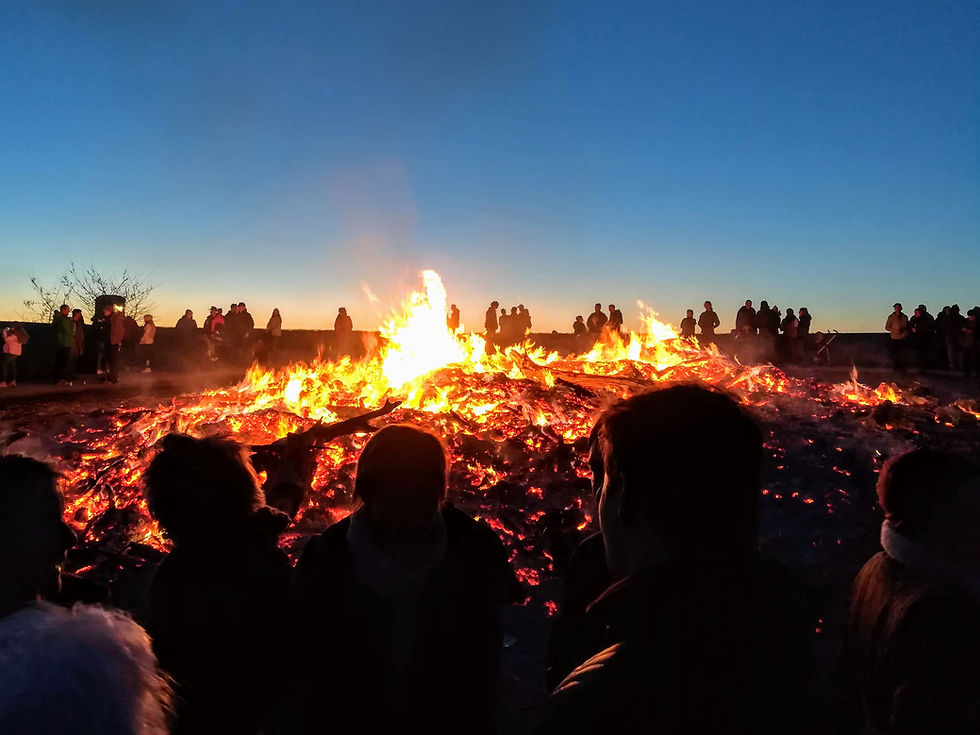Sunday Homily, 2 November 2025 - Fr Paul Rowse, OP
- paulrowse
- Nov 2, 2025
- 3 min read
Gospel episodes like this one prompt an important question: if the dead can be raised to life again with us, what happened to them between death and their revival? It’s important to consider, because the dead who were raised by Jesus weren’t newborns or zombies: they were the same person. The youth whom Jesus raised started talking, just one of the signs that he was his old self again. No doubt, his first words were: “What’s all the fuss about, Mum?”
So, what happens after we die? It cannot be complete destruction, because there were dead people who were restored to their old life. There’s a point of continuity which belongs to the person and lives on despite their mortal body.
Ours is the belief which was emerging in Israel just a couple of centuries before the Lord’s birth: though death will lay hold of the body, it doesn’t keep the soul as well. The soul has a kind of life of its own. After death, the immortal soul exists; it thinks and feels after a fashion; it sees what God allows it to see; it prays and it also loves. Our dear departed love us and pray for us.
The soul’s after-life isn’t a full life. They don’t get up to the same things we do. They’re not affected by the same things we are. They never tire out, get hungry or thirsty; they’re not bothered with the weather or very much with time. What affects them most is their past life.
The souls of our dear departed are rather passive. Although they have a few functions they can perform, their existence is largely pre-determined, set by the story of their past. If they performed good deeds and have been forgiven their sins, they enjoy light, refreshment, and peace. If they performed misdeeds and have not been forgiven their sins, they have no light and no peace.
So, we shall resolve to do all-good while we can and to seek forgiveness for our sins, so that God will send our souls to the saints. But also, we shall do good deeds for the dead, so that they will be with God’s saints too.
All wrongs must be righted, but some wrongs need not be righted by the same person. God has many ways of seeing justice done. We know this from the suffering of the innocent. Often they’ll say that they hope their suffering brings good to the lives of others – I can assure you, it does.
There’s mercy in this: we can pray and do penance the dead need to do. God allows us to right their wrongs, by doing good on their behalf. We need to be teaching our children to do the same, so that each generation will help the ones before them.
As with material charity, so with spiritual charity: if we can help, then we must help. We have the responsibility while we live to do good on behalf of those souls who are judged worthy of heaven but aren’t yet ready for it. Purgatory is a place of mercy, where compassion and power align to bring life to the dead. The Lord raised the youth to life because his compassion and power came together. And in him, we too feel for those who have died; we love them still, and do all we can to help.

We can help the dead mainly with our prayers. We can have Masses offered. We can pray, especially the Rosary: “Pray for us sinners, now and at the hour of our death” has a special meaning this month of the Holy Souls. We can visit a cemetery and say a litany of the saints or today’s Psalm: “It is your face, O Lord, that I seek; hide not your face” (Psalm 26/27:8).
We can also do penance, and here we should consider indulgences. An indulgence is the forgiveness of all the punishment our sins deserve; we can gain indulgences on behalf of someone who has died. A plenary indulgence is the forgiveness of all the punishment. Today, we can gain a plenary indulgence for the dead by visiting a church and saying the Our Father and Creed under the usual conditions of sacramental confession, Holy Communion, and prayers for the Pope’s intentions, in a spirit detached from all sin. Certainly, it would be praiseworthy to gain a plenary indulgence as soon as we hear that someone has died.
The souls live on, each according to how they lived here. We can help them be all that God created them to be by prayer and penance on their behalf. We pray for them, so they’ll pray for us. Then we shall all be happily reunited in heaven, to the glory of the ever-living God.
Fr Paul Rowse, OP Parish Priest


